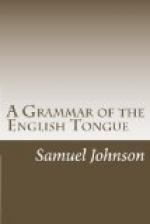Sing. I have, thou hast, he hath
or has,
Plur. We have, ye have, they have.
Has is a termination connoted
from hath, but now more frequently used
both in verse and prose.
Simple Preterit.
Sing. I had, thou hadst, he had
Plur. We had, ye had, they had.
Compound Preterit.
Sing. I have had, thou hast had,
he has or hath had;
Plur. We have had, ye have had, they
have had.
Preterpluperfect.
Sing. I had had, thou hadst had,
he had had.
Plur. We had had, ye had had, they
had had.
Future.
Sing. I shall have, thou shalt have,
he shall have;
Plur. We shall have, ye shall have,
they shall have.
Second Future.
Sing. I will have, thou wilt have,
he will have;
Plur. We will have, ye wilt have,
they will have.
By reading these future tenses
may be observed the variations of shall
and will.
Imperative Mood.
Sing. Have, or have thou, let him
have;
Plur. Let us have, have or have ye,
let them have.
Conjunctive Mood.
Present.
Sing. I have, thou have, he have;
Plur. We have, ye have, they have.
Preterit simple as in the Indicative.
Preterit compound.
Sing. I have had, thou have had,
he have had;
Plur. We have had, ye have had, they
have had.
Future.
Sing. I shall have, as in the Indicative.
Second Future.
Sing. I shall have had, thou shalt
have had, he shall have had;
Plur. We shall have had, ye shall
have had, they shall have had.
Potential.
The potential form of speaking is expressed by may, can, in the present; and might, could, or should, in the preterit, joined with the infinitive mood of the verb.
Present.
Sing. I may have, thou mayst have,
he may have;
Plur. We may have, ye may have, they
may have.
Preterit.
Sing. I might have, thou mightst
have, he might have;
Plur. We might have, ye might have,
they might have.
Present.
Sing. I can have, thou canst have,
he can have;
Plur. We can have, ye can have, they
can have.
Preterit.
Sing. I could have, thou couldst
have, he could have;
Plur. We could have, ye could have,
they could have.
In like manner should is united to the verb.
There is likewise a double Preterit.
Sing. I should have had, thou shouldst
have had, he should have had;
Plur. We should have had, ye should
have had, they should have had.
In like manner we use, I might have had; I could have had, &c.
Infinitive Mood.
Present. To have.
Preterit. To have had.
Participle present. Having.
Participle preterit. Had.




